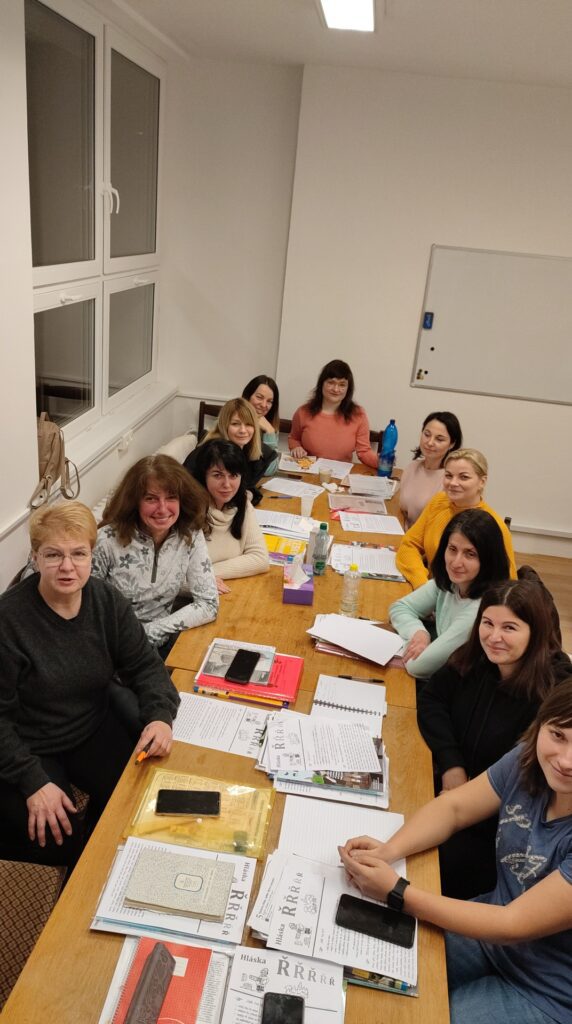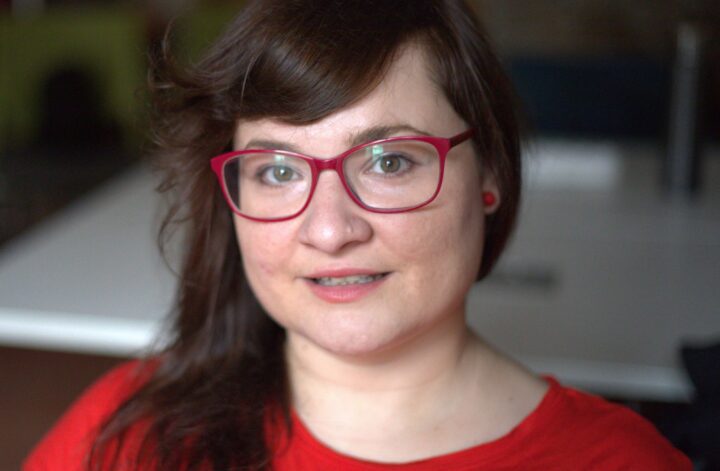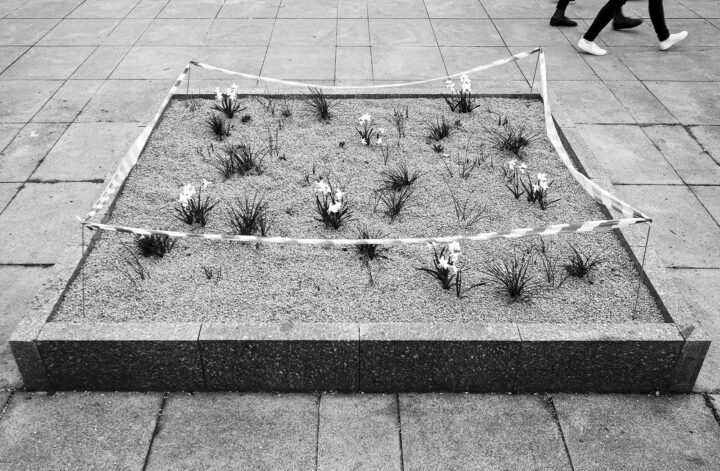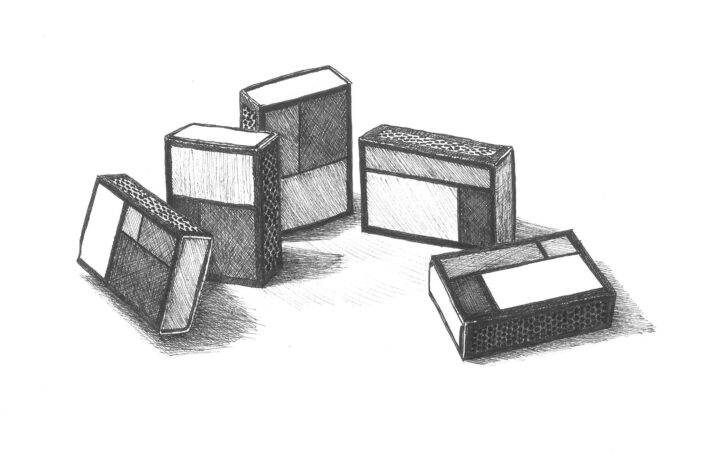Autor: Natalie Czaban
Foto: Osobní archiv Pavly Válkové
Perex: We never appreciate the use of our own language as much as when we are deprived of it, in a foreign land where nobody understands us and nothing we are used to makes sense. Pavla Válková has spent her career helping people in this situation, teaching German and Czech to students of various cultures and backgrounds. At present she teaches Czech to Ukrainian refugees here in České Budějovice. Milk & Honey interviewed her about the ups and downs of this job, which is for her more of a calling.
Pavla, how do you find teaching Czech to Ukrainians?
Both rewarding and exhausting! Rewarding because I see so much hope and progress in them. Some people begin a beginner’s course unable to say anything beyond „Dobrý den“ and in a few weeks or months they have mastered the tenses, can order food, arrange their lives. I love to see that what I do has an effect.
And what makes it exhausting?
Maybe the responsibility I take upon myself for my students. I have always seen teaching languages as more a destiny or mission, rather than a job. I have also been in the position of arriving in a foreign country without anything, for example when I lived in Austria as a student. Even though I was not a refugee, it was still no picnic to work through all the complex administration and I was often reliant on the good will of other Austrians to help facilitate my legal stay. I have a lot of empathy for foreigners. I want my lessons to be a safe, happy space for them – an open-minded, respectful atmosphere, where they know they will not be judged or looked down upon. I also sometimes feel that I am a kind of bridge between worlds for them, a guide to „normal“ Czech society. For example, recently the janitor of one school asked me to explain to one student that here we put toilet paper in the toilet, not the little waste bin beside it. Such a little thing! But if explained wrongly that person could feel embarrassed or ashamed. And if I don’t help them navigate these tiny and bigger differences in our cultures then who will?
What motivated you to take on the task of teaching Czech to Ukrainians?

I already had experience of teaching refugees from various Middle Eastern countries in Austria, when I lived in Vienna as a student. These people were totally uprooted and had absolutely no knowledge of German. When you are teaching a new language in that language, to absolute beginners, you have to become an actor, keep it very simple and express yourself beyond words. When Russia invaded and Ukrainian refugees started arriving, it struck me that not many teachers in the Czech Republic have this experience of teaching Czech to non-speakers. The established methodology for teaching Czech to Czech children is of course tailored to native-speakers and young people. So, I felt necessary. Also, I must admit that, as much as I admired the Austrian system, I saw mistakes there that I did not want repeated in the Czech Republic.
What kind of mistakes?
Firstly, I have to say that the Austrians had a very solid system for integration, which we are lacking here in the Czech Republic. Overall, they have made a real success of integrating refugees. But they were also too lenient in some ways. For example, refugees seemed to have very many opportunities to retake language exams, which did not motivate them to actually make progress in German. I have been to districts of Vienna where whole communities function without any German and this is a really dangerous situation. When you have sub-groups within a society that cannot communicate and understand each other, it is fertile soil for resentment and intolerance. I did not want to see this ghettoization effect in the CR. As a language teacher I have enormous sympathy and affection for my students, but I am also very strict. I expect people to attend regularly, and work hard or they will not get the qualifications they need. I really am no pushover! Thankfully, my overwhelming experience of the Ukrainians is that they really want to learn Czech, and to integrate and work hard whilst they are here.
What difficulties do Ukrainians have with the Czech language?
Whilst the languages are admittedly similar, learners never know for sure which words and structures from their language they can use in Czech and which not. Also, many students have Russian rather than Ukrainian as a native language which is even further removed from Czech. One thing I feel is not given enough attention is learning the Latin script, as these students are familiar only with the Cyrillic one. In Austria, Middle Eastern students would have extensive training just in reading and writing in Latin script, before any attempt at learning the language. Here in the CR, it is all done at once. There are also many false friends [viz tabulka, termín “falešní přátelé” v jazykovědě označuje dvojice slov, která v různých jazycích znějí stejně či podobně, ale významově se zásadně liší, pozn. redakce], for example, our czech “úžasný” means awful, “čerstvý” is old and stale. Another barrier is their level of education. When I teach Czech to my other European students, for example Postdocs at the university, I can explain grammar to them in English and they have experience of studying languages. This is not always the case with refugees, which are a total mix of levels and aptitudes.
How would you describe your approach?
To be honest, I try to adapt to my students. Everyone needs something different. But I am personally a very structural person, I like to have a systematic approach. I make sure all the main skill sets are covered equally and that basic structures are then used to build more complex language. I always make sure the progress tests and final tests are appropriately challenging and that only students who deserve to will pass, a model of testing I adapted from the Austrian ÖSD (Österreichisches Sprachdiplom). I am supported by the local Ukrainian community such as Ukrajinské komunitní centrum Nadija, who are are keen to show that refugees don’t expect everything for free. They decided that whilst the first two Czech language courses are paid by the City Council, the follow-up courses are partly financed by the participants themselves.
What have you learned about Ukrainian culture from your students?
Mainly small things, for example, that they give Christmas presents on New Year’s Eve, their festivals are much more linked to the Orthodox church. In general, they are more religiously minded than us atheist Czechs. I also consider it part of my job to help them understand our culture and history. It is important that nobody sees us, or them, as just leftovers of a past Russian regime but nations and cultures with very long and deep histories. I have learned things about their perceptions of the Czech Republic that surprised me too. An older Ukrainian woman said that Czech goods were a sign of quality in Soviet times, people always tried to buy Czech shoes for example.
And do you talk about the war?
Only when it is necessary or beneficial. I want my lessons to be a break from their constant fear and worry and give them back some sense of normality. But it does come up of course. We have in the past discussed the liberation of Ukrainian territories, which left students feeling more positive and hopeful. It is much harder to have the lessons when participants have just found out some bad news – that relatives or friends have been hurt or even that someone close to them has been killed. On one such occasion I could see that the whole class were devastated, I was also devastated. I thought, what can I do here to help? So after a while I began the lesson as normal and even in that short time we found some small things to laugh about. I want to take their minds off all the suffering and horror, even for a little while.
Would you recommend your job to other teachers?
Yes, because I love the work and as I have said,I get very emotionally involved. But I don’t want to make it seem like all teachers have to invest so much emotional energy to be effective. I have learned a lot and the students are so wonderful. I have very rarely met with rude or unpleasant refugees – they are more or less the exception but unfortunately, they receive huge attention, as they are louder and more visible and because they bolster people’s prejudices. You cannot judge a whole nation by one idiot. My overwhelming feeling is that we are lucky to have these refugees amongst us, I wish people could see how hard they work, how amazingly resilient they are. I want them to understand us and be understood by us. That is why I do what I do.
Slova, která znějí stejně
| № | čeština | ukrajinština | ruština |
| 1 | trup | mrtvola | mrtvola |
| 2 | vor | – | zloděj |
| 3 | pohanka | muchomůrkajedovaté houby | muchomůrkajedovaté houby |
| 4 | horký | hořký | hořký |
| 5 | slabý | nemocný | nemocný(!)mít “slabý” význam |
| 6 | сhudý | hubený | hubený |
| 7 | ovoce | zelenina | zelenina |
| 8 | zelenina | koření a bylinky | koření a bylinky |
| 9 | prach | lidský popel | lidský popel |
| 10 | okurek | – | nedopalek |
| 11 | stůl | židle | židle |
| 12 | chytrý | mazaný | mazaný |
| 13 | lékárna | nemocnice | – |
| 14 | úkol | injekce | injekce |
| 15 | nevěstka | snacha | snacha |
| 16 | zapomněl | – | vzpomněl |
| 17 | žínka | manželka | – |
| 18 | zastavit | – | přinutit |
| 19 | vonět | – | páchnout |
| 20 | pozor | hanba | hanba |
| 21 | život | břicho | břicho |
| 22 | holka | jehla | – |
| 23 | místo | město | – |
| 24 | jahody | lesní plody | lesní plody |
| 25 | plot | – | vor |
| 26 | zákaz | – | objednávka |
| 27 | vlažný | vlhký | vlhký |
| 28 | kuře | kouří (výslovnost je trochu jiná) | kouří(výslovnost je trochu jiná) |
| 29 | záchod | (!) [захід]oficiální akce | – |
| 30 | svět | – | světlo |
| 31 | kozačka | žena kozáka | žena kozáka |
| 32 | klubok | klubko | klubko |
| 33 | výlet | vzlet letadla / odlet | vzlet letadla / odlet |
| 34 | podvodník | člověk, který pracuje na ponorkách | člověk, který pracuje na ponorkách |
| 35 | zopakovat | zabalit | zabalit |
| 36 | vonavko | něco, co smrdí | něco, co smrdí |
| 37 | kalhoty | kalhotky, punčochy | kalhotky, punčochy |




